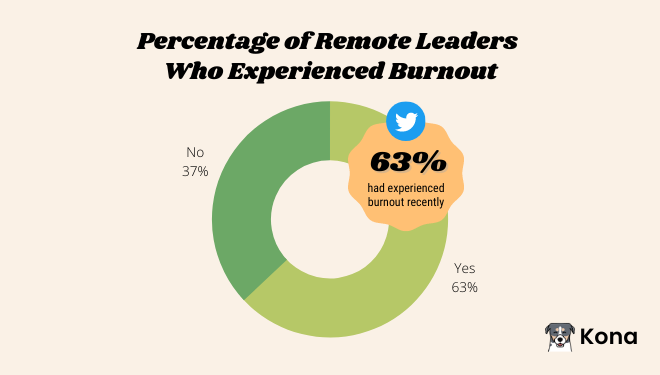This year's Remote Manager Report is finally here! Be the first to read it.
Remote leaders are experiencing burnout and some leaders don't have the resources to support their team's mental health. We dive into the hard-hitting data and what it means for remote tech companies.

One tool for pulse checks, team building, and coaching––in Slack. Free forever. No credit card required.
Try for FreeOr book a demo to learn more.
In early May, we launched a pledge for Mental Health Awareness month in an effort to help break the mental health stigma in the workplace.
We asked leaders to share their mental health stories in a video series. The level of vulnerability they shared with us was overwhelming.
A CEO shared how they cope with anxiety. A career coach opened up about their life-long struggle with complex PTSD.
These stories from real people-leaders drove home the concept that discussing and supporting mental health in the workplace shouldn’t be an add-on; it’s a must-have.
There’s a clear tie between businesses that don’t actively support their employee’s wellbeing leading to burnout.
Kona interviewed and surveyed 350 remote leaders from top tech companies to ask about their level of burnout, access to mental health resources, and hiring plans. Here’s what we found.
Key findings:
Employee burnout is when someone is facing exhaustion, cynicism towards a job, and inefficiency at work. It doesn’t happen overnight. Employee burnout is oftentimes a slow burn and if it goes unaddressed by employers for too long, it leads to low employee engagement, retention rates, customer satisfaction, and profitability.
These issues might sound like a no-brainer for employers to address, yet, the remote leaders we surveyed were loud and clear: a majority of leaders are burnt out.

Here are the breakdowns by key demographics on what remote leaders are experiencing burnout in 2022:
By seniority, VPs (81%) and CXOs (78%) had the most burnout out of any seniority group.

Roles at the top of the hierarchy in organizations oftentimes have multiple teams reporting to them. As a result, their role requires them to direct business strategies and juggle people’s needs.
By function, internal-facing roles like Operations (90%) and Human Resources (62%) had the highest concentration of burnout. Similarly, cross-departmental roles, such as Product (67%) and Marketing (67%) shared that they faced feelings of burnout.

It’s clear that burnout isn’t limited to one function or seniority level across the organization, but it affects some more than others.
But does leadership burnout reflect how well they support their team?
We asked remote leaders if they have adequate time, training, and resources to support their team’s mental health and burnout needs. We found that 46% agreed or strongly agreed with this statement. Therefore, despite most leaders experiencing burnout themselves, it appeared that the majority felt well equipped to support their teams where they needed it most.
However, 30% of respondents disagreed or strongly disagreed with the statement, shedding light on the well-being gap that exists for some organizations.

Whether it was the impact of The Great Resignation, or part of a major growth stage, one question we asked had a blaringly clear answer: remote tech companies are hiring.
Despite imminent hiring freezes and layoffs in recent weeks, many organization’s recruiting and hiring efforts are still going strong.

What’s this mean for organizations?
In order to keep and attract top talent, it is crucial for companies to proactively offer and improve mental health and wellbeing benefits, as well as manager coaching.
To uncover how equipped managers are with soft skills, such as building trust and creating a psychologically safe work environment, we asked them what they struggle with most.
We found that relationship building (21%) was the most difficult soft skill to build. Managing burnout (16%) came in second.

These results speak to how businesses need to plan for long-term remote work and invest in their people. By preventing burnout as well as coaching managers on how to problem-solve and lead remote teams effectively, increased retention, profitability, and customer satisfaction will follow. Consider using adding Kona to Slack to support your remote organization (it’s free, forever!).
For more information on how to get started at your organization, we cover that here:
Methodology: Kona conducted 350 interviews with remote leaders at 175 top remote companies. All of the responses were reviewed by our team for quality control. We defined a remote manager as someone who:

We uncovered the hard-hitting data around burnout and mental health. If you want a qualitative look into the stories these remote leaders are sharing, take our Mental Health Awareness Pledge where you can watch recorded videos of exactly what they face.
Looking for a quote or graphic for your feature? Email our Head of Content, Sarah Archer (sarah@heykona.com), for a unique quote from one of our co-founders and/or the original graphics to back up the data.